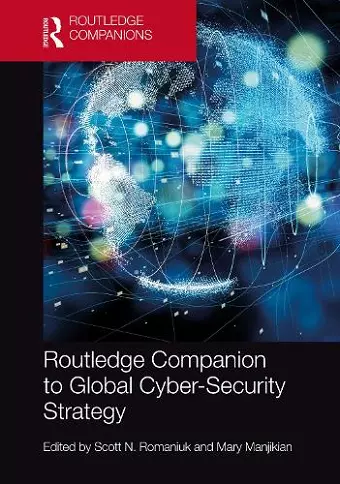Routledge Companion to Global Cyber-Security Strategy
Mary Manjikian editor Scott N Romaniuk editor
Format:Hardback
Publisher:Taylor & Francis Ltd
Published:29th Jan '21
Currently unavailable, and unfortunately no date known when it will be back
This hardback is available in another edition too:
- Paperback£43.99(9780367620660)

This companion provides the most comprehensive and up-to-date comparative overview of the cyber-security strategies and doctrines of the major states and actors in Europe, North America, South America, Africa, and Asia.
The volume offers an introduction to each nation’s cyber-security strategy and policy, along with a list of resources in English that may be consulted for those wishing to go into greater depth. Each chapter is written by a leading academic or policy specialist, and contains the following sections:
- overview of national cyber-security strategy;
- concepts and definitions;
- exploration of cyber-security issues as they relate to international law and governance;
- critical examinations of cyber partners at home and abroad;
- legislative developments and processes;
- dimensions of cybercrime and cyberterrorism;
- implications of cyber-security policies and strategies.
This book will be of much interest to students and practitioners in the fields of cyber-security, national security, strategic studies, foreign policy, and international relations.
'To create this omnibus collection, Romaniuk (Univ. of Alberta) and Manjikian (Regent Univ.) gathered the most comprehensive possible set of essays on national cybersecurity policies. Each of the 51 chapters provides an up-to-date summary and analysis of a single country's cybersecurity situation and strategies. Hostile-state actors, online terrorists, organized criminal groups, black hat hackers, and other bad actors all must be countered through sophisticated advance planning. Defenders are generally at a significant disadvantage against their nimbler attackers. Policies vary according to how each nation defines and prioritizes the potential threats. An authoritarian government, for example, will be far more concerned with controlling politically sensitive information that might undermine the power of the ruling regime than a more democratic nation. A maritime country is likely to prioritize different defenses than one that is landlocked. Countries that were once parts of the former Soviet Union fear hybrid warfare attacks that might be launched from Russia. Although the individual essays provide fine summaries of the unique laws, political forces, and social dynamics obtaining in each nation discussed, the book as a whole would have been greatly enhanced by expanding the editors' nine-page introduction to further integrate the themes drawn from these diverse contributions.
Summing Up: Recommended. Upper-division undergraduates. Graduate students, faculty, and professionals.'
--T. H. Koenig, Northeastern University, Choice, December 2022
ISBN: 9780367024239
Dimensions: unknown
Weight: 1370g
24 pages